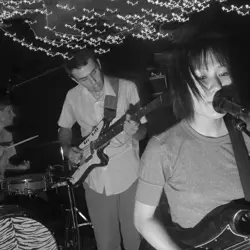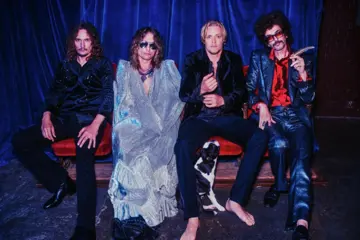 Deerhoof
DeerhoofThough he may be in town promoting his band's latest album, Deerhoof drummer Greg Saunier can't actually listen to it. “When you listen to nothing else for three months straight, trying to make sure that the snare is the right volume every time it's hit and having scrutinised it to such an absurd degree, it's hard to know what it sounds like,” he laughs in a typically verbose and chuckle-laden outburst. “You have to wait for the dust to settle and get away from the chaos of making something and obsessing over it completely.”
Saunier and his bandmates have created what is possibly the most danceable album of Deerhoof's lengthy career. With highlights that include the critically lauded LP, Friend Opportunity, Sufjan Steven's favourite album of all time, The Runners Four, and their previous, tropicalia-influenced release, Deerhoof Vs Evil, Deerhoof have made a trademark of gleeful unpredictability. “Obviously, the danger of repeating yourself happens all the time with bands,” he says carefully, “but it doesn't happen with us. A band that has a big hit gets stuck in a trap; the fans want to hear the song and when it comes time for another record to get made, there is a machine that pushes them to make a record like that last one. If you do that you know you're screwing yourself, you're shooting the respect of your fans in the foot by becoming more conservative with your musical choices. In our case, there is no hit, no sound or melody or style so we've never been under any pressure to repeat ourselves. Our only pressure is to do new surprising things, unexpected things, something people wouldn't expect you to do, something we wouldn't expect ourselves to do,” he chuckles. “We have four songwriters in the band and, if anything, we've got more daring over the years. When we started the band we were more… grunge,” he says laughing loudly. “We were a heavy, noisy, rock band and we'd never have the nerve to say 'I've got this orchestral ballad,' or 'I've got this reggae song,' whereas now it feels like there's almost a dare between the band and the audience to see what we can pull off.”
This freedom is something possible to embrace by every band starting out, but few other bands twelve albums, ten EPs and 19 years into their career can boast of it. “We rarely think of adopting another musical genre, only in the vaguest terms. Breakup Song is more danceable, and dance music is the most vague genre you can think of. Yes we do have ideas of what we might want to do next, but when you're first brainstorming and dreaming of these things you're rarely thinking which section of the record store you want to colonise next. It's more about a way you want to feel when you're making a song or a way you'd like to feel with an audience when you're on stage playing. With Breakup Song, we're more concerned with, 'Does it feel fun, does it feel energetic, is it flirty, does it feel sassy or sociable?'”
Deerhoof have done everything. They've 'become' The Rolling Stones in an updated version of Sympathy For The Devil, have been invited by David Bowie to play at his Highline Festival, toured with Radiohead, composed a soundtrack for Justin Theroux's film, Dedication, and become part of The Plastic Ono Band. Despite these brushes with fame, they are, essentially, four people painstakingly constructing meticulously written and tightly played songs over laptops, something Saunier feels is reflected on the cover of Breakup Song, a picture of a garbage truck.
Don't miss a beat with our FREE daily newsletter
“The cover photo was something [singer] Satomi [Matsuzaki] took on her telephone really late coming home from a mixing session. It was 3am and there was a garbage truck in front of her house. At the time we were trying to finish the record – all four of us were working nonstop – somebody was at the computer trying to come up with a mix, improve a melody or add some overdub to something. We had been talking a lot about an idea we had called a 'jingletron', which is a music party machine that has lights and makes a lot of noise – if you set it up it would make an instant party,” he guffaws loudly. “In her delirium she thought this was a jingletron; under the truck a bunch of people were having a huge dance party and this truck managed to bring that and it would secretly move around town and cause these instant parties to erupt wherever it went,” Saunier says, finally rendering himself speechless with laughter. Along with an example of a jingletron, the band's website features a half-hour video made to accompany Breakup Song in which Matsuzaki and Saunier are seen chasing garbage trucks around Brooklyn. “Garbage trucks aren't the most notable things in life,” he admits, “but after we put it on the cover and made the video now every time I see one it's exciting. I'm like, 'Check the lights on that one! It's a bit red but orange too, it's twinkling!' It's like some magic character has been brought to life or something.”
Live, this manic energy and constant inventiveness fuels the Deerhoof show and, naturally, not every audience can keep up; something that doesn't bother Saunier. ”The audience might have wildly different reactions at the same time, not just: 'I liked it' and 'I didn't like it'. We have devoted fans who come to every show they can, and we have some extreme haters. Often amongst those fans, people like it for totally different reasons. Some people like to dance or shout and sing along, other times people are getting very quiet and listening intently to every detail like we're classical music. Some people like the noise and the intensity of it and other people think it's cute and they like how melodic it is – they find it very sweet. Other people find it violent. I find the people who detest it the most come to love us later. I've had that reaction to music many times myself. It's the process of figuring out why to like it or how to like, and this makes you like it more; you have to fight for it and I like this process a lot.”
Deerhoof will be playing the following dates:
Friday 1 March - The Zoo, Brisbane QLD
Saturday 2 March - The Annandale, Sydney NSW
Sunday 3 March - Schoolhouse Studios, Melbourne VIC
Wednesday 6 March - Adelaide Festival, Adelaide SA















